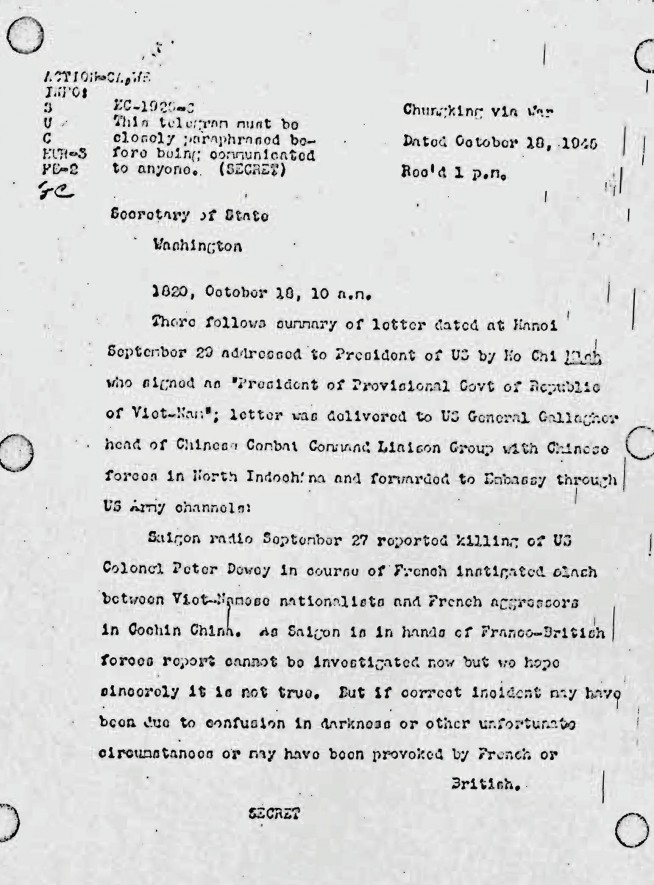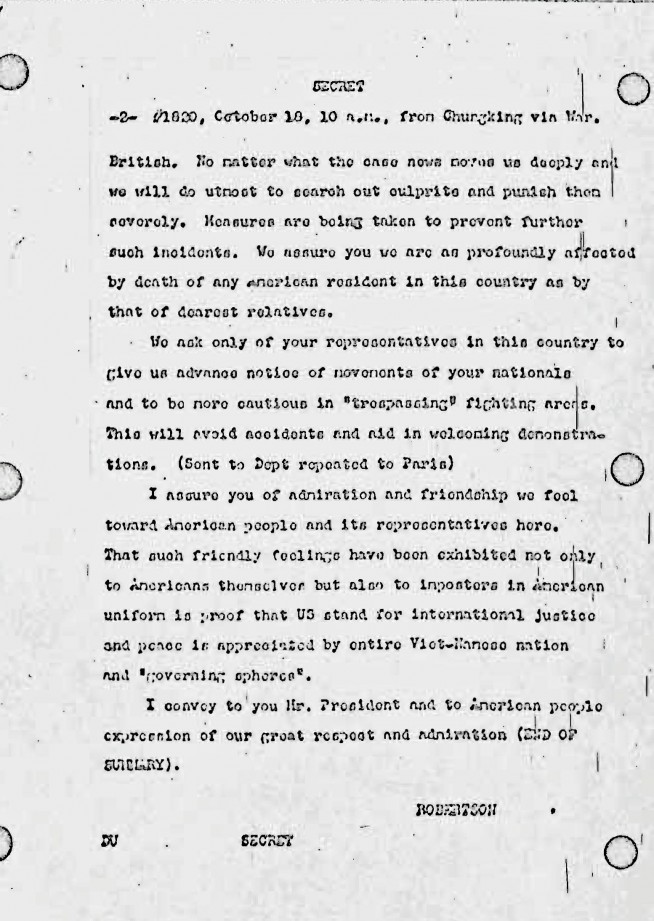By Callie Oettinger
September 26, 1945, A. Peter Dewey was killed in Vietnam, becoming the first casualty in what would become the Vietnam War.
From Mark Thompson’s Time article “War Through ‘Enemy’ Eyes“:
America’s first casualty in Vietnam was a mistake. He was an Army officer by the name of A. Peter Dewey. A member of the Office of Strategic Services — the forerunner of today’s CIA — Dewey arrived in Vietnam two days after Japan surrendered on September 2, 1945. His assignment was to help search for MIAs and to assist the English general who had just arrived in Saigon in maintaining order in the southern half of Vietnam. As he observed the English general treat the Vietnamese as a conquered people rather than an ally who had helped defeat the Japanese, Dewey voiced his displeasure to Washington. He quickly fell out of favor with the English general, who managed to get Dewey recalled to Washington.
Just before Dewey left for Saigon airport to head home, he filed his last report on Vietnam. In a hauntingly ominous observation, he wrote: “Cochinchina (South Vietnam) is burning; the French and British are finished here, and we ought to clear out of Southeast Asia.” Although Dewey’s final report was received in Washington, he never made it home. He was ambushed on the way to the airport by Viet Minh (precursor to the Viet Cong) soldiers who mistook him for a French officer. Dewey not only became the first American post-World War II casualty of Vietnam, but also the first MIA there as well as his body was never recovered.
From WGBH’s 1981 Interview with Herbert Bluechel, who was with Dewey when he was killed:
So if you turned the corner uh to take the road leading to our headquarters, parallel to our headquarters, we encountered a roadblock and uh consisting of some logs and some brush and, in order to get through the roadblock we had to make a sort of an inverted “S”. . . .
Well, with that, we were just on the spade edge of the “s” heading for the ditch and machine gun opened up, and the burst caught Peter in the back of the head, on the left side. The jeep continued and tipped on its side.
And um, I grabbed a hold of Peter but…he was dead, ’cause machine gun burst had hit him, exclusive, didn’t hit me at all and there weren’t even any, as I recall, no bullet holes through the windshield, so he caught the full burst.
Well the ditch was about four or five deep ‘n, four or five feet deep and next to the ditch on the other side it’s a hedge, hedge is about three feet thick, maybe six, eight feet high. Uh, firing continued, rifle fire, but the chassis of the jeep protected me.
I had a forty-five in my holster and I had three clips, total of twenty-one rounds of ammunition. Peter had a carbine, thirty caliber carbine in the jeep. I grabbed that. It jammed right away, it was, I don’t think it’d been fired in months and months and months. So I, I had to get, get out of there.
I went back to the jeep again and checked on Peter and nothing I could do for him. So I made my way around the hedge to…the other side of the hedge is a golf course. So, the hedge protected me too and I made way down the hedge. People came around the end of the hedge and started firing at me. There were about fifteen or twenty.
And there’s firing coming through the hedge, too, but I slowed ‘em down with the forty-five and uh ’till I got down to the edge of the hedge, then there was no more protection and they were still coming and I had two rounds left, so I took off across the golf course, I had to run about roughly five hundred yards to our headquarters.
Then they fired everything, shot my hat off, went through my trousers, but they didn’t hit me. Just lucky. Hmm. So I went to the, arrived at headquarters, and um, Captain Frank White was there and he had two war correspondents, guests for lunch. Sergeant Wicks was there. And we broke out our arms and uh we had a pitched battle for about an hour or so. Turns out that Peter Dewey was the first American to be killed in Vietnam. Huh.
From the New York Times‘ September 26, 1945 article “Indo-China Rebels Kill U.S. Officer: Slay Lieut. Col. A. Peter Dewey From Ambush—British Arrest Commander of Japanese“:
Lieut. Col. A. Peter Dewey of Washington, D.C., was killed and Capt. Joseph Coolidge of New Hampshire was seriously wounded by Annamese in disorders today.
Other American officers, defending United States headquarters from a siege of three hours, killed at least eight natives.
British, French and Japanese also suffered casualties in a series of incidents. As a result of the continued disorders, Field Marshal Count Juichi Terauchi, the Japanese commander, was placed under virtual house arrest.
Summarized letter from Ho Chi Minh to President of U.S., expressing sympathy at the death of Colonel Peter Dewey, O.S.S. Commander in Saigon. Enjoins President to provide advance notice of movements of American nationals, but expresses appreciation for “U.S. stand for international justice and peace.” Image and caption: Pentagon Papers, Part I.
CALLIE OETTINGER was Command Posts’ first managing editor. Her interest in military history, policy and fiction took root when she was a kid, traveling and living the life of an Army Brat, and continues today.


